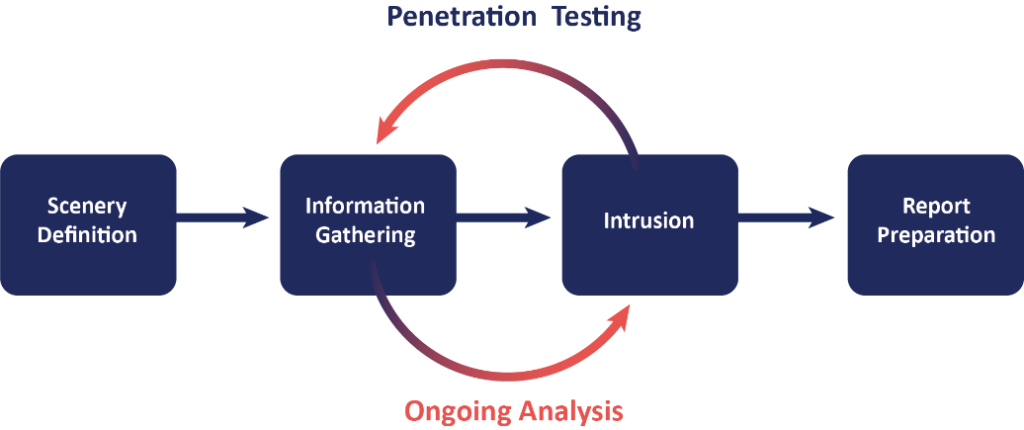How Will AI Change Penetration Testing?
By Akash Desai, Director, ERMProtect IT Security Consulting
Artificial intelligence (AI) is the talk of the town. It is the breakthrough technology that promises to revolutionize the way almost all industries operate today. It comes as no surprise then that AI will also make transformational changes in the field of cybersecurity as well.
AI has already found application in various cybersecurity tools and products related to:
- Bot defense
- Threat monitoring
- Email protection
- Phishing monitoring
- Network security
- Endpoint security
Most of these products use machine learning that learns from data and identifies patterns. AI has the capability of linking a series of events and creating patterns that provide threat intelligence and detect early intrusion attempts.
There are also attempts to integrate AI into penetration testing methodologies. That offers a reason to smile for penetration testers as AI can significantly improve penetration testing outcomes.
Think of it as two brains working together. AI could really help pen testers go farther down the road when exploiting vulnerabilities. And then there are also concerns that AI could take over a penetration tester’s job in the long run.
Let’s delve into a deeper discussion before jumping to conclusions.
Will AI Revolutionize Penetration Testing?
Penetration testing is an important assessment that organizations need to perform to test their cybersecurity program, security defenses, and maintain regulatory compliance.
Penetration testing can take time. It depends on the number of assets in the organization to be tested and the complexity.
Current AI research and innovation points to some tangible benefits.
Automation in AI Penetration Testing
AI can analyze troves of data in very little time and provide more structured and valuable output from its analysis.
For instance, during the information gathering phase of a penetration test, AI can analyze publicly available sources on the Internet to gather information regarding the hosts and provide comprehensive details on the scope of information assets.
Such detailed information can provide the pen tester with a robust understanding of the target network and assets. It can help form a solid base for the advanced exploitation steps that follow.
Speed in AI Penetration Testing
Scanning a huge list of in-scope information assets takes a long time in penetration testing. With vulnerability scans leveraging AI technology, less time would be needed for this task than today’s traditional scanners.
AI modules could also provide insight into the most vulnerable/valuable targets based on behavioral analysis and machine learning. This could allow pen testers to take a more efficient approach towards exploitation and concentrate more on targets that appear to be more exposed or those that hold more value.
Precision in AI Penetration Testing
It’s well-known how AI can help write code. Well, it can also help with writing automated scripts for exploitation.
AI can maneuver across known vulnerabilities and generate code to exploit these vulnerabilities. AI modules can learn from code models and generate new exploit code to evade detection.
AI can also offer precision when it comes to finding the most applicable vulnerabilities when there are too many vulnerabilities to manually investigate.
Productivity in AI Penetration Testing
And of course, all of this leads to more efficiency and productivity. In addition, AI can offer more elaborate and structured reporting using machine learning technology.
With metrics, threat intelligence gathered across different phases, and precise reporting, pen testers could gain actionable insights from such reports.
Will AI Lead to Penetration Testers Losing Their Jobs?
While there are reasons to leverage AI capabilities into penetration testing, the notion that you can rely solely on AI to complete a full penetration test poses some significant challenges at least for now.
Let’s take a look at a few of them.
AI Penetration Testing False Positives
AI can analyze data quite well, granted. But the longstanding issue of false positives that has pained penetration testers for years does not go away with AI.
One of the reasons for this is the fact that data sets for cybersecurity aren’t as comprehensive because, despite having been around for a while, cybersecurity is still a new domain.
Furthermore, it’s dynamic and fast-changing.
So, a new vulnerability could come up in an hour from now and AI is left with a challenging task and very little data to learn from. And so, if there aren’t enough patterns or data sets for AI to learn from, this would likely lead to false positives.
And let’s not forget – as much as researchers want to use AI in penetration testing, so do hackers. Hackers could program their own AI modules to mess with algorithms and feed corrupt or inaccurate data patterns.
It’s the same cat and mouse game where both the cat and mouse got the same upgrades.
AI Penetration Testing Ethical Considerations
AI can go deep but how deep it should be allowed to go? This is where human discretion comes into the picture.
Remember that there are times when a specific test or exploit could lead to a server going down for a while or even crashing. Add to this the fact that AI’s speed and depth could lead to conditions that the target infrastructure might not be able to handle.
You could end up with irreversible damage done to production infrastructure.
Penetration testers know when and where to step back but that can be a challenging task for AI. Judgment calls are not easy to “train” into AI.
Ethical hackers, on the other hand, put the “ethical” into hacking.
AI Penetration Testing Adaptability
Each penetration test is different. Several factors come into play, such as:
- Infrastructure
- Applications
- Network
- Client expectations
- Downtime
Human adaptability and understanding of what a client needs and what best suits an organization is difficult to replace with an AI module.
AI Penetration Testing Is In Its Infancy
One of the biggest things that goes against AI, at least for now, is its infancy.
It’s amazing and promising, but the proverbial rubber still needs to meet the road. There are also essentially no regulations governing this aspect of technology yet and as history tells us, regulatory compliance often proves to be a slippery slope.
AI Penetration Testing Lacks Soft Skills
Penetration testing is not just about testing but also about soft skills and human interaction which play an important role in aspects such as explaining a complex vulnerability in an easier manner for a non-technical group of key client executives.
So, Is AI About to Change Penetration Testing?
Absolutely!
Penetration testing as we know it is all set to change for sure. But AI will find it hard to outdistance the human brain that developed it in the first place.
AI advancements will surely help in several aspects of penetration testing, but there will always be a need for human intervention.
AI is not a substitute for penetration testers.
It’s an additional technology that can enhance the traditional methods followed and strengthen the results of penetration testing assessments.
That said, penetration testers will need to level up with AI technology in the future potentially by using AI based testing tools for their speed and automation benefits.
So, there is definitely a strong application of AI in penetration testing on the horizon, but the good news is that it won’t be the first time that penetration testers will have upskilled to a new technology.
The future of penetration testing appears to be a hybrid approach.
With the sophisticated capabilities of AI, you can foresee how organizations will be able to better fortify their defenses much.
And penetration testers don’t need to sweat. Think of AI as an additional tool in the penetration tester’s arsenal. If anything, it’ll make the job easier and more efficient.
ERMProtect is Preparing for AI in Penetration Testing
When you go to war against hackers, you want to be on the battlefield with a firm that has been fighting for a long time. ERMProtect has been doing penetration testing for over 26 years. We offer a suite of services including:
- Application Penetration Testing
- Cloud Infrastructure Penetration Testing
- ICS/SCADA Penetration Testing
- ISO 27001 Penetration Testing
- PCI Penetration Testing
- Physical Site Penetration Testing
- Social Engineering Penetration Testing
- IoT Penetration Testing
We bring in-depth knowledge of regulatory requirements and a focus on bottom-line impact to each assignment. Having served more than 500+ clients across 39+ industries gives us deep insight into vulnerabilities that lead to data breaches. For more information, please email Judy Miller at [email protected] or call 305-447-6750.
Subscribe to Our Weekly Newsletter
Intelligence and Insights

Are You Prepared for an AI-Powered Cyber Attack?

AI Privacy Risks





